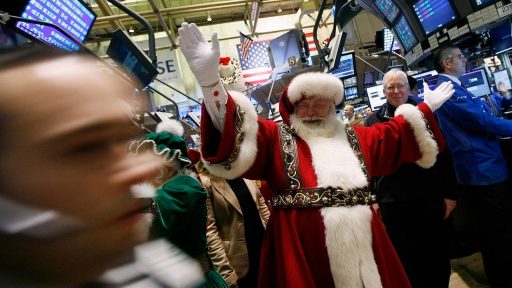- Home
- >
- Fundamental Analysis
- >
- Will Grinch steal the Santa Claus rally this year?

Will Grinch steal the Santa Claus rally this year?

Perhaps we should all give thanks that the market is closed for Thanksgiving. It’ll give us a chance to recover from quite a beating – and for some, time to wish for a “Santa Claus rally” to rescue stocks.
It’s rough out there. The November-to-April period seasonally has been the best time of the year to be invested. It looked like that might be the case this time around, too. After a devastating October that saw the Standard & Poor’s 500-stock index drop almost 7%, November started strong.
Alas, it didn’t last.
Stocks started sliding again in the second week of November, and by the week of Thanksgiving they had already taken out the October bottom. As of this writing, the S&P 500 was about 2% away from hitting new 52-week lows.
Is a Santa Claus rally still in the cards? December is a historically strong month, after all. The final month of the year has been positive more often than any other, finishing higher 66 out of the past 90 years. And the market indeed is ready for a reprieve in December following two lousy months in a row.
But don't hang your hat on Santa Claus coming to town.
Why the Grinch Could Steal Christmas
We’ll start with stock valuations, which never seem to matter … right until they do.
Expensive markets can continue to get even more expensive, sometimes for years. Consider that Alan Greenspan first complained about “irrational exuberance” in the markets as early as 1996. It would be well over three years until the market finally rolled over. Yet when the bubble finally burst in the first quarter of 2000, it got ugly. The market was down 15% by year end and proceeded to lose nearly half its value before it finally hit bottom.
There’s no guarantee the market will follow a similar path this time around. But it’s worth noting that when the S&P 500 peaked in late September, it was actually more expensive than at the top of the 2000 tech bubble, at least as measured by the price-to-sales ratio.
Again, markets don’t fall simply because they’re expensive. But when stocks are priced for perfection, expectations get more and more difficult to meet. Eventually, investors lower their expectations, which means revaluing stocks. A company growing at, say, 10% per year is worth a lot less than one growing at 20% per year.
This brings us to another reason why investors might end up with coal in their stockings this year. Last year’s corporate tax cuts were a game changer. In many cases, companies were paying half as much as they were previously in taxes. Every dollar not paid in taxes is a dollar of profit that investors get to keep.
Well, we’re now coming up on the one-year anniversary of the cuts. That means come the first quarter of next year, we’ll no longer be comparing higher post-cut profits to lower pre-cut profits. That’s a big deal, and Wall Street is starting to come to terms with that.
U.S. economic growth has remained strong, and this has been a major plank in the bull’s argument. The economy grew 3.5% last quarter on an annualized basis and 4.2% the quarter before that.
But remember, the stock market itself is a leading indicator, not a coincident indicator. Stocks tend to fall before the economy cools.
A 10% correction doesn’t by any stretch suggest that a recession is imminent. But signs abound that the economy might not be quite as strong as it looks on the surface. Housing starts and new home permits are down sharply, as home affordability has finally become an issue for a lot of potential first-time buyers. The prices of existing homes are also starting to soften, too. Home prices are still rising, but the rate of increase has been in decline for most of 2018. Hot markets such as San Francisco, Seattle and Portland have actually seen prices decline.
The final threat to a Santa Claus rally is the Federal Reserve.
The Fed has been steadily raising rates for multiple years now; today, the Fed funds rate sits at 2.25%, and experts expect it will rise to 2.5% in December. The Fed funds rate is higher than the S&P 500’s dividend yield for the first time in ages. And with the Federal Reserve promising to raise rates multiple times in 2019, investors might decide that a safe 2.5% to 3% in a CD is preferable to the vagaries of the stock market.
Despite all of this, stocks could end up enjoying a massive rally to cap off the year. Stranger things have happened. But perhaps this little spate of volatility should instead be considered a wake-up call to re-evaluate your asset allocation and consider diversifying into bonds or other assets.
 Trader Georgi Bozhidarov
Trader Georgi Bozhidarov Read more:
If you think, we can improve that section,
please comment. Your oppinion is imortant for us.











